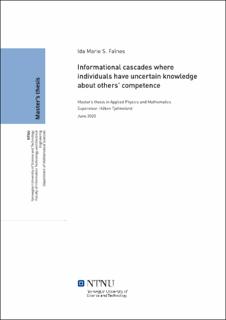| dc.contributor.advisor | Tjelmeland, Håkon | |
| dc.contributor.author | Falnes, Ida Marie S. | |
| dc.date.accessioned | 2021-09-15T17:25:42Z | |
| dc.date.available | 2021-09-15T17:25:42Z | |
| dc.date.issued | 2020 | |
| dc.identifier | no.ntnu:inspera:55607230:35943459 | |
| dc.identifier.uri | https://hdl.handle.net/11250/2778332 | |
| dc.description.abstract | Informasjonskaskader er et fenomen knyttet til beslutningstakning. De oppstår når rasjonelle individer betrakter det som optimalt å ignorere sin egen, private kunnskap, og heller velger å kopiere atferden til tidligere beslutningstakere. Fenomenet er tett knyttet til observasjonslæring; å samle informasjon gjennom observasjon av andre individers handlinger.
I denne rapporten presenterer vi en modell for sekvensiell beslutningstakning med et binært handlingsrom. Vi antar at hvert individ observerer beslutningen til tidligere beslutningstakere før han eller hun tar sin egen beslutning. I tillegg antar vi at hver beslutningstaker har en personlig kompetanse knyttet til beslutningen som skal tas. Hvert individ kjenner til sin egen kompetanse, men har kun et usikkert estimat på andres kompetanse. Vi definerer modellen matematisk, og utleder et generelt uttrykk for sannsynligheten for de to mulige beslutningene for hvert individ.
Modellen er numerisk implementert, og kjeder av beslutninger simuleres. Ved å bruke Metropolis-Hastings-algoritmen undersøker vi om det er tilstrekkelig informasjon om systemet i de observerte beslutningene til å estimere modellparametre. Resultatene fra simuleringsstudien tyder på at det ikke er nok informasjon i de observerte beslutningene alene til å oppnå rimelige estimater på modellparametrene. Vi foreslår å tillate mer informasjon i systemet, i tillegg til å forbedre algoritmen for å oppnå raskere konvergens til målfordelingen. | |
| dc.description.abstract | Informational cascades occur when rational individuals consider it optimal to ignore their private knowledge, and rather choose to copy the behaviour of their predecessors when making a decision. The phenomenon is closely related to the process of gaining information through observation of other individuals' actions - what is called observational learning.
In this thesis, we present a model of sequential decision-making with a binary action space. We assume that prior to making his or her decision, each individual observes the decisions of the previous decision-makers. We further assume that each decision-maker has a personal competence related to the decision at hand. All individuals have perfect knowledge about their own competence, but have only uncertain knowledge about other individuals' competences. We define the model in a mathematical fashion, and derive a general expression for the probability of both possible decisions for each individual.
The model is numerically implemented, and sequences of decisions are simulated. Using the Metropolis-Hastings algorithm, we investigate if there is enough information in the observed decisions alone to be able to estimate parameters from the model. Results from the simulation study indicate that there is not enough information in the observed decisions to obtain sufficiently accurate estimates for the model parameters. We suggest to improve the algorithm in order to increase the rate of convergence to the limiting distribution, in addition to allow more information to enter the system. | |
| dc.language | | |
| dc.publisher | NTNU | |
| dc.title | Informational cascades where individuals have uncertain knowledge about others' competence | |
| dc.type | Master thesis | |
